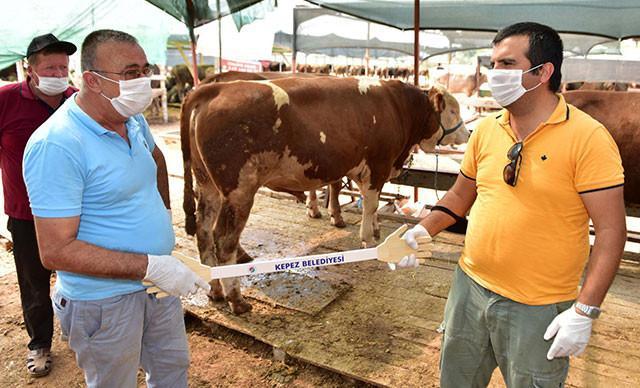
Turkey will not impose any restrictions during the four-day Eid al-Adha, but officials have continued to urge members of the public to strictly implement social distancing rules amid concerns that social interactions during the holiday can cause a surge in the number of new coronavirus cases.
“All our institutions have concluded their preparations for Eid al-Adha,” President Recep Tayyip Erdoğan said after a weekly cabinet meeting late July 27.
The ministers delivered a presentation about the preparations for a safe and healthy Eid and holiday at the cabinet meeting, where Erdoğan did not mention any restrictions concerning Eid al-Adha.
Eid al-Adha will begin on Friday 31 July and end on Aug. 4.
Erdoğan said all hygiene measures at animal markets where sacrificial animals are sold and slaughtered have been taken by local governances but urged people not to hold the sacrifice of the animals on the first day of Eid to avoid crowds.
“We all have to abide by the rules of hygiene, wearing masks and practicing social distancing. Thank God, we are almost there. Good days await us as we will get the rewards for our sacrifices when we leave the pandemic behind,” Erdoğan said.
There are, however, concerns that more social interactions during the feast will cause an increase in the number of new infections, which are no fewer than 900 daily.
Health experts have warned that Turkey needs a 50-day plan in place by fall in order to prevent a possible second wave of the outbreak in winter.
At meetings with government officials, experts cautioned that a series of measures, which will last until fall, should be taken, daily Hürriyet reported.
People, who spend the summer months in provinces in the Anatolian region, will start to return to larger provinces in the fall, which may lead to a surge in the coronavirus cases, they reckoned.
“Those who attended crowded gatherings in those provinces during the summer will come back to Istanbul and other metropolitan cities having likely contracted the virus,” they said.
If precautions are not taken, a spike in the number of cases could be likely, they warned.
It is believed that 2.5 people out of 1,000 have the virus, which means some 200,000 contracted COVID-19. “This figure must come down to somewhere between 10,000 and 20,000 by the winter,” the experts said.
The number of confirmed coronavirus cases in Turkey has surpassed 227,000 with more than 5,600 deaths from COVID-19.
“The number of patients in intensive care units increased in the last three days in Istanbul, the capital Ankara, the Central Anatolian province of Konya, southern Gaziantep and southeastern Diyarbakır provinces,” Health Minister Fahrettin Koca wrote on Twitter on July 27.
“In 21 provinces, we did not have any intensive care patients in the last three days,” he said.
Nearly 1,300 patients are receiving treatment in intensive care units while there are 392 intubated patients.
More than 210,000 people have recovered from the disease to date. Turkey has carried out more than 4.6 million tests with 45,000 tests on July 27 alone.
The government has announced that bridges and motorways will be free of charge during Eid al-Adha starting from midnight on July 30 and until 7.00 a.m. on Aug. 4, according to a decree published in the Official Gazette.